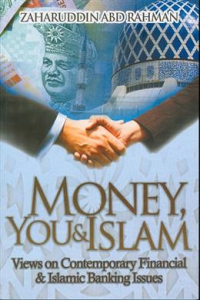Author of book: Dr. Zaharuddin Abd Rahman
Retyped on site by: Muaz.
Definition of Riba in the most absolute form – which includes both the jami’ (comprehensive) and mani’ (restrictive) meanings.
Forms of Riba
The Shafi’ee mazhab divides riba into 3 forms.
- Riba al-fadl
- Riba an-nasiah
- Riba al-yad
|
RIBA AD-DUYUN (DUE TO DEBT) The interest rate caused by duration |
|
|
Riba al-qard That is the rate or any additional benefit conditioned on the principle. This condition is made at the beginning of the loan contract, introduced by the lender upon the borrower. |
Riba al-jahiliyyah That is the rate or any additional benefit exceeding the principle due to the borrower’s failure in paying of the loan within agreed time. The lender will impose a fine on the borrower because of his request to delay the debt repayment or due to his failure in paying off debts within a fixed period. |
| RIBA AL-BUYU’ (DUE TO TRADING OF USURIOUS ITEMS)
The inequality of weight or quantity of the two usurious items exchanged or in deferment |
|
| Riba an-nasak
The trading or exchanging of two usurious items of the same kind in deferment. (i.e. transaction is not completed on the spot) Eg:
Riba exists when the above transaction takes place in deferment.
|
Riba al-fadl
The trading or exchanging of two usurious items of the same kind with different weight or quantity. Eg:
|
To avoid Riba al-Fadl and Riba an-Nasak:
- The weights must be equal (although may differ in quality and value)
- The transaction must be concluded on the spot (both seller and buyer cannot depart until they deliver their respective items)
The Ruling of Riba in Islam
| ONE WHO GIVES OR EATS RIBA WILL WAGE WAR AGAINST ALLAH S.W.T. & HIS MESSENGER |
|
| DIMINISHING BLESSINGS OF WEALTH & LIFE | |
| Punishment in this world
A sign of the wealth of those who deal with riba is not blessed:
– his wealth will be tested through robbery and treachery |
Punishment in the Hereafter
Ibn Abbas stated: “It will not be accepted from the consumer of riba (who uses his riba-based wealth) his charity, his hajj, his jihad and his extending of kinship.” |
| AS IF COMMITING ZINA | |
| Commiting zina with one’s own parent
“Riba is of seventy-two types: the least of them is equivalent (in sin and filthiness) to a man having intercourse with his mother.”
(At-Tabrani, 7/158; al-Hakim) |
Commiting zina 36 times
“A dirham that a person knowingly eats of riba is worse, before Allah, than thirty-six acts of zina.”
(Related by Ahmad & Ad-Dar Qutni) |
| IT IS ONE OF THE SEVEN DEADLY SINS |
| “Avoid the seven deadly sins: shirk, black magic, killing someone without just cause, eating an orphan’s property, consuming riba, running away from the battlefield and accusing chaste woman of fornication.”
(Related by al-Bukhari and Muslim) |
Taken from the book: “Money, You & Islam” by Dr. Zaharuddin Abd Rahman

